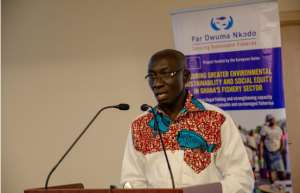
According to the African Union, the continent loses between US$2-5 billion annually due to the mismanagement of African fisheries, citing inadequate transparency and accountability among the implicating factors, and the limited structured participation of users and non-state actors in policy formulation and resource management efforts.
It is against this backdrop that, Civil society organisation and players in the fishing industry in Ghana are calling for greater transparency and accountability to improve the management of the country’s fisheries resources. While expressing worry about the decline of fish stocks to its lowest recorded levels, they believe if this is done it will help resolve the challenges being faced in the sector.
These were made known at a roundtable on fisheries transparency in Accra organised by the implementing partners of two European Union-funded fisheries projects in Ghana - Far Dwuma Nkodo implemented by Hen Mpoano and the Environmental Justice Foundation (EJF) and Far Ban Bo implemented by Care International, Friends of the Nation and Oxfam. The projects aim to secure and protect fisheries livelihoods.
Speaking on behalf of the Minister for Fisheries and Aquaculture Development, a Deputy Director at the Ministry, Thomas Insaidoo said it is time for Ghana to consider the issue of transparency and accountability in the fisheries. “We have a resource that is facing many challenges as far as sustainability is concerned.”
Transparency has been gaining attention in Ghana at the highest levels of government. In March and September 2018, the President of Ghana Nana Addo Dankwa Akufo-Addo met with Dr. Peter Eigen, founder of Transparency International (TI), the Extractive Industry Transparency Initiative (EITI) and the Fisheries Transparency Initiative (FiTI) and committed Ghana to implementing the FiTI.
Representatives of the fishing industry associations and civil society at the round table threw their support behind the President’s commitment to implement the FITI in Ghana. They encouraged government to register Ghana’s interest with the FITI Secretariat to provide the opportunity to move forward with the FiTI process.
Mr Christopher Ackon from the EU Delegation to Ghana, in a statement said that, “It is good to see this collaboration and that industry will push the regulators to ensure FiTI becomes alive in Ghana. Transparency is key to the governance of natural resources.”
The meeting identified a number of priority areas where greater transparency and accountability are urgently needed. Participants called on the Ministry of Fisheries and Aquaculture Development and the Fisheries Commission to routinely publish and update key information on the sector, including fines for fisheries offences observer reports, licencing of trawlers and vessel ownership as well as utilization of the fisheries development fund.
Indeed, providing access to credible information is a low cost yet highly effective means of enhancing accountability of government institutions, ensuring meaningful participation of stakeholders in decision-making, and tackling the illegal fishing operations that thrive in opaque operating environments.




 We’ll protect state wealth from opaque deals – Prof Jane Naana
We’ll protect state wealth from opaque deals – Prof Jane Naana
 Mauritania president says running for second term in June polls
Mauritania president says running for second term in June polls
 I won't ever say I was a mere driver’s mate' — Prof. Opoku-Agyemang
I won't ever say I was a mere driver’s mate' — Prof. Opoku-Agyemang
 2024 polls: 'EC struggling to defend credibility'— Prof. Opoku-Agyemang
2024 polls: 'EC struggling to defend credibility'— Prof. Opoku-Agyemang
 Akufo-Addo gov't's 'greed, unbridled arrogance, unrestrained impunity, sheer dis...
Akufo-Addo gov't's 'greed, unbridled arrogance, unrestrained impunity, sheer dis...
 Election 2024: Ghana needs an urgent reset, a leadership that is inspiring – Ma...
Election 2024: Ghana needs an urgent reset, a leadership that is inspiring – Ma...
 Partner NDC to rollout a future of limitless prospects – Prof Jane Naana Opoku-A...
Partner NDC to rollout a future of limitless prospects – Prof Jane Naana Opoku-A...
 NPP will remain in gov’t till Jesus comes — Diana Asamoah
NPP will remain in gov’t till Jesus comes — Diana Asamoah
 Sunyani Technical University demands apology from former SRC president over sex-...
Sunyani Technical University demands apology from former SRC president over sex-...
 'Dumsor' was resolved by Mahama but ‘incompetent' Akufo-Addo has destroyed the g...
'Dumsor' was resolved by Mahama but ‘incompetent' Akufo-Addo has destroyed the g...
